CIA Sponsored Terror, Civil Liberties, Criminalizing Dissent, Habeas Corpus, Human Rights, NSA Spying, Surveillance, Targeting Muslims, Truth to Power, War Resister
Podcast: Play in new window | Download
Update:
- Rev Billy And The Stop Shopping Choir: Radical Ritual At Trump Tower
—-
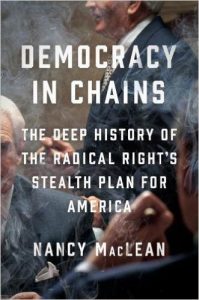
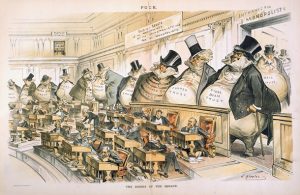
Democracy in Chains: The Deep History of the Radical Right’s Stealth Plan for America
The spectacle of President Donald Trump and the palace intrigue in the White House has served daily to distract people from the political strategy and accomplishments of the radical right, which is taking over the Republican Party.
Over time, the GOP has been transformed into operation conducting a concerted effort to curb democratic rule in favor of capitalist interests in every branch of government, whatever the consequences. It is marching ever closer to the ultimate goal of reshaping the Constitution to protect monied interests. This gradual take over of a major political party happened steadily, over several decades, and often in plain sight.
Duke University Professor Nancy MacLean exposes the architecture of this change and it’s ultimate aim. She has written that “both my research and my observations as a citizen lead me to believe American democracy is in peril”.
Guest – Professor Nancy MacLean, whose new book, Democracy in Chains: The Deep History of the Radical Right’s Stealth Plan for America, has been described by Publishers Weekly as “a thoroughly researched and gripping narrative… [and] a feat of American intellectual and political history.” Booklist called it “perhaps the best explanation to date of the roots of the political divide that threatens to irrevocably alter American government.” The author of four other books, including Freedom is Not Enough: The Opening of the American Workplace (2006) called by the Chicago Tribune “contemporary history at its best,” and Behind the Mask of Chivalry: The Making of the Second Ku Klux Klan, named a New York Times “noteworthy” book of 1994, MacLean is the William H. Chafe Professor of History and Public Policy.
—-
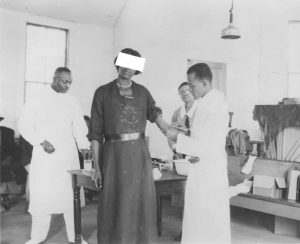
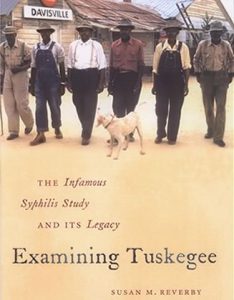
Tuskegee Syphilis Study Aftermath
The Tuskegee Syphilis Study was a biomedical clinical study conducted by the US Public Health Service for four decades between 1932 and 1972. Its purpose was to observe the natural progression of untreated syphilis in rural African-American men in Alabama under the guise of receiving free health care from the government.
It collaborated with the historically black Tuskegee University in Alabama. Investigators enrolled a total of 600 impoverished African American sharecroppers from Macon County, Alabama. Of these men, 399 had previously contracted syphilis before the study began, and 201 did not have the disease. They were given free medical care, meals, and free burial insurance for participating in the study. After a cure for syphilis was discovered in penicillin, the study still continued without informing the men they would never be treated. According to the Centers for Disease Control, the men were told they were being treated for “bad blood,” a local term for various illnesses that include syphilis, anemia, and fatigue.
Guest – Professor Susan Reverby is Marion Butler McLean Professor in the History of Ideas and Professor of Women’s Studies at Wellesley College. She is editor of Tuskegee’s Truths: Rethinking the Tuskegee Syphilis Study.
——————————————
CIA Sponsored Terror, Civil Liberties, Criminalizing Dissent, Human Rights, Political Prisoner, Surveillance, Targeting Muslims, Truth to Power, War Resister
Podcast: Play in new window | Download
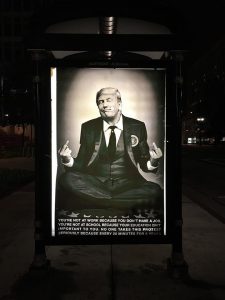

This is Not Populism : John Bellamy Foster
Is Trump a neofascist? Thoughtful analysts on the left like Cornell West, Noam Chomsky, and Judith Butler think he is. But mainstream liberal commentators refuse to associate the Trump phenomena with fascism. They call him a right wing populist. What is neofascism? Right wing Populism? Does it really matter what Trump is called? The great German playwright and political thinker who lived in Germany during Hitler’s reign, Berthold Brecht, asked in 1935: “How can anyone tell the truth about fascism, unless he’s willing to speak out against capitalism, which brings it fourth?” We speak today with John Bellamy Foster, the editor of the venerable magazine “Monthly Review”. He wrote the lead article in the current June 2017 issue titled “This Is Not Populism.”
Guest – John Bellamy Foster is editor of Monthly Review and professor of sociology at the University of Oregon. He has written widely on political economy and has established a reputation as a major environmental sociologist. He is the author of Marx’s Ecology: Materialism and Nature (2000), The Great Financial Crisis: Causes and Consequences (with Fred Magdoff, 2009), The Ecological Rift: Capitalism’s War on the Earth (with Brett Clark and Richard York, 2010), and The Theory of Monopoly Capitalism: An Elaboration of Marxian Political Economy (New Edition, 2014), among many others.
—-


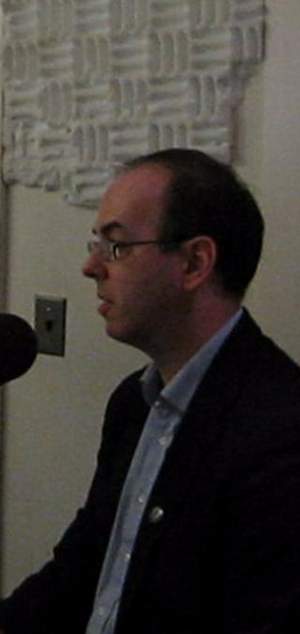
Crossing Hitler: The Man Who Put the Nazis on the Witness Stand
Author Benjamin Hett outlines the fascinating and tragic story of a young lawyer Hans Litten in his recent book Crossing Hitler: The Man Who Put the Nazis on the Witness Stand. Before the Nazis rose to power in the early 1930s, they incited calculated violence among the working class in German taverns. Four Nazi stormtroopers were charged with firing randomly into a dance hall where a communist hiking club were holding a party. Three young men were wounded. Hans Litton was the advocate for the 3 men.
Hans Litten called Hitler to the witness stand to show that the Nazi party was a violent party, and by cross examining Hitler he tried to prove that. Litten forced Hitler to contradict himself, reducing him to humiliating rage that revealed his true intention. At that time, Hitler wanted to be a legal party in Germany and of course you couldn’t be a party that was extra-constitutional and legal but at the same time he didn’t want to disappoint the base of his party which was this violent working class aspect. Two years later, the Nazi Party rose to power.
What came after the Reichstag Fire was the arrest of about 5 thousand people across Germany who the Nazis have identified as opponents or potential opponents. Hans Litten was among them and sent to a concentration camp. Author Benjamin Hett describes a powerful narrative of Hans facing torture yet still telling stories and teaching art to other prisoners.
Hans Litten was born in 1903 in Halle in Central Germany, his father was a law professor and Jewish but converted to German evangelical (Lutheran).
Guest – Benjamin Hett, author of Crossing Hitler: The Man Who Put the Nazis on the Witness Stand. Hett is a former trial lawyer, and now Associate Professor of History at Hunter College.
————————————————–
CIA Sponsored Terror, Civil Liberties, Crony Capitalism, NSA Spying, Supreme Court, Targeting Muslims, Torture
Podcast: Play in new window | Download
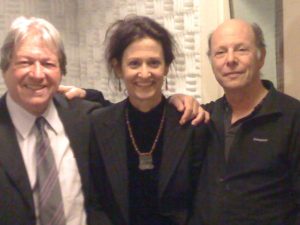

Law and Disorder Outtakes: Disorderly Bloopers
We first began recording Law and Disorder in 2004, the same year the Republican National Convention—and large protests—were held in New York City. When we started, we had four hosts—Dalia Hashad and Michael Ratner along with Michael Smith and Heidi Boghosian.
After a few years, Dalia moved to California, leaving us with three hosts. In late spring 2016 we lost Michael Ratner to cancer. Now there are just two of us.
It is our special pleasure to share with listeners our first segment of The Disorderly Bloopers, behind-the-scenes audio outtakes from the first years we were on the air.
Law and Disorder was created during the George W. Bush administration to cover what we thought would be some of the darkest days in the nation’s history. As part of our special summer episode we thought these studio snippets might provide a few minutes of much-needed levity.
It’s important to take a few minutes to laugh at ourselves, and to look back at the hundreds of fun days that we here at Law and Disorder have had over the years.This has also been a trip down memory lane for Heidi and Michael as we hear hilarious interchanges with Dalia and Michael Ratner.
As we covered some of the most serious topics in the news, and amidst the enormous respect we had for all of our guests, the four of us wholeheartedly enjoyed a special relationship, along with our longstanding producer Geoff Brady. It’s a relationship that comes from working closely together and respecting each other as colleagues and friends.
—-
Hosts Read Some of the Best Courtroom Transcripts
Q: Doctor, before you performed the autopsy, did you check for a pulse?
A: No.
Q: Did you check for blood pressure?
A: No.
Q: Did you check for breathing?
A: No.
Q: So, then it is possible that the patient was alive when you began the autopsy?
A: No.
Q: How can you be so sure, Doctor?
A: Because his brain was sitting on my desk in a jar.
Q: But could the patient have still been alive nevertheless?
A: It is possible that he could have been alive and practicing law somewhere.
—-
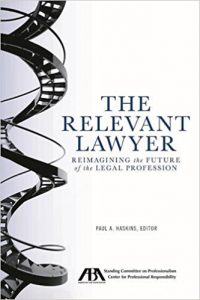

The Relevant Lawyer: Reimagining the Future of the Legal Profession
Hosts alternate in reading part of a chapter on Attorney Charles Garry in the book The Relevant Lawyer: Reimagining the Future of the Legal Profession by Paul A. Haskins. Haskins is senior counsel in the American Bar Association Center for Professional Responsibility and lead counsel for the Standing Committee on Professionalism.
——————————————————-
Civil Liberties, Habeas Corpus, Human Rights, Iraq War, NSA Spying, Political Prisoner, Prison Industry, Prosecution of the Bush Administration, Supreme Court, Surveillance, Targeting Muslims, Torture, War Resister
Podcast: Play in new window | Download
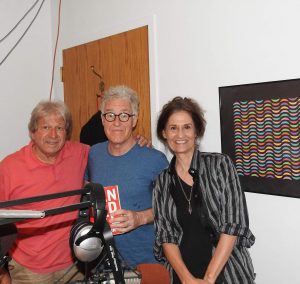
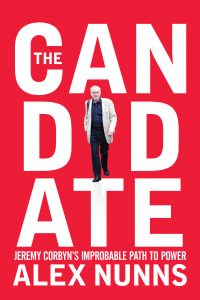
Jeremy Corbyn Labour Party Victory
One of the bright and hopeful developments in world politics was the wide support that Jeremy Corbyn, the leader of the British Labor Party got in that country’s recent elections. Corbyn ran on an unabashedly left platform. His party recruited tens of thousands of young people before and after the election. Although the conservative Government of Prime Minister Teresa May is still in power this is not likely to last long. To speak with us today about these developments in Great Britain and their relevance to the United States where we saw a similar phenomenon with the rise of Bernie Sanders, is Colin Robinson.
Guest – Colin Robinson is from Liverpool England and he lives in New York City. He’s the publisher of OR Books. Colin Robinson worked as a senior editor at Scribner and was previously managing director of Verso Books and publisher of The New Press. Among the authors he has published are Tariq Ali, Noam Chomsky, Alexander Cockburn, Mike Davis, Norman Finkelstein, Eduardo Galeano, Eric Hobsbawm, Lewis Lapham, Mike Marqusee, Rigoberta Menchú, Matt Taibbi and Jann Wenner.
—-
Raymond Nat Turner
Poem: Low Regard
—-
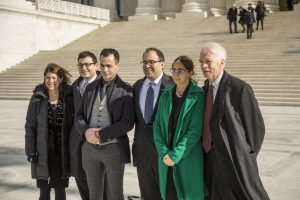
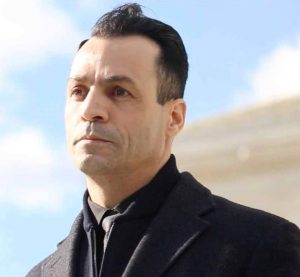
SCOTUS on CCR CASE
Just a few weeks ago the Supreme Court reversed a federal appeals court ruling that former high-level Bush administration officials may be sued for their roles in the post-9/11 profiling and abuse of Muslim, Arab, and South Asian men.
After the 9/11 attacks, hundreds of non-citizens were rounded up solely on the basis of their race, religion, ethnicity, and immigration status. They were held in extremely restrictive confinement and physically and psychologically abused. The Court held that high-level government officials who implement and create clearly unconstitutional policies alleged to be based on national security are nonetheless shielded from liability.
However, the Court did allow plaintiffs the chance to prove their case against Warden Dennis Hasty, finding that complaint’s allegations, “plausibly show the warden’s deliberate indifference” to the abuse plaintiffs suffered while they were held at the MDC. The claims against the Warden will be sent back to the lower courts for an opportunity to show that prison administrators are not entitled to the same immunity given to high-level officials in this case.
Guest – Senior Managing Attorney Shane Kadilal from the Center for Constitutional Rights. His cases there include challenges to the indefinite detention of men at Guantánamo and domestic immigration sweeps. He has been counsel in major CCR cases challenging the material support statute, the low rate of African-American firefighter hiring in New York City, and the NSA’s warrantless surveillance program.
———————————————
CIA Sponsored Terror, Civil Liberties, Criminalizing Dissent, Habeas Corpus, Human Rights, NSA Spying, Political Prisoner, Surveillance, Targeting Muslims, Truth to Power
Podcast: Play in new window | Download


This is Not Populism : John Bellamy Foster
Is Trump a neofascist? Thoughtful analysts on the left like Cornell West, Noam Chomsky, and Judith Butler think he is. But mainstream liberal commentators refuse to associate the Trump phenomena with fascism. They call him a right wing populist. What is neofascism? Right wing Populism? Does it really matter what Trump is called? The great German playwright and political thinker who lived in Germany during Hitler’s reign, Berthold Brecht, asked in 1935: “How can anyone tell the truth about fascism, unless he’s willing to speak out against capitalism, which brings it fourth?” We speak today with John Bellamy Foster, the editor of the venerable magazine “Monthly Review”. He wrote the lead article in the current June 2017 issue titled “This Is Not Populism.”
Guest – John Bellamy Foster is editor of Monthly Review and professor of sociology at the University of Oregon. He has written widely on political economy and has established a reputation as a major environmental sociologist. He is the author of Marx’s Ecology: Materialism and Nature (2000), The Great Financial Crisis: Causes and Consequences (with Fred Magdoff, 2009), The Ecological Rift: Capitalism’s War on the Earth (with Brett Clark and Richard York, 2010), and The Theory of Monopoly Capitalism: An Elaboration of Marxian Political Economy (New Edition, 2014), among many others.
—-



US Normalization of Relations With Cuba Reversed
On June 15th President Donald Trump traveled to Miami to condemn Cuba for gross human rights violations while he signed an executive order aimed at reversing the process of normalization of relations between Cuba and the United States that has been going on since December 2014.
Trump spoke to a dwindling base of hardened reactionaries in Miami. He accused Cuba of “spreading violence and instability “as justification to increase restrictions on the travel of Americans to Cuba and to double down on the blockade by eliminating any business dealings with Cuban state run enterprises administered by the Cuban military.
Now, for an American citizen to go to the small island 90 miles from Florida they must go in a group with a minder and report everywhere they travel and with whom they meet.
Since the success in 1959 of the Cuban revolution the United States government has been trying to reverse it and restore capitalist property relations on the island of 11 million people.
The Cuban revolution truly was a revolution and not in the Madison Avenue sense. It was not superficial but profoundly fundamental. The 99%; poor peasants, city workers, and intellectuals overthrew the 1%; the super rich, the large landowners, the owners of the utilities in mines, and their American partners – the United States and trained and supplied army and the police. The 99% took back their own country and the 1% largely move to Miami. 50,000 Cubans died in their struggle.
From then until now the policy and practice of the United States government has been to take Cuba back, change the regime, and re-introduce capitalist property relations by any means necessary.
At first, US backed terrorist torched sugar crops because land was taken from the rich and redistributed to the peasants. The US supported the assassination of teachers during the hugely successful literacy drive. The CIA introduced dengue fever and swine flu killing children and livestock awake. They supported a full-scale military invasion in 1962 known as the Bay of Pigs. It failed. The US initially succeeded and isolating Cuba politically, diplomatically, and economically.
Latin American and Caribbean governments were overthrown by the CIA if they didn’t go along with this policy. Only Mexico held out. But this tactic didn’t work. Cuba overcame the isolation. The US itself became isolated for its hostility. Then in 2014 the organization of American states told the United States that unless it allowed Cuba to re-join the United States itself was unwelcome.
So the USA, led by President Obama, changed tactics, but not its goal to restore capitalism to Cuba. In July 2015 Cuba was recognized. Embassies were opened in Havana in Washington. Trade and travel restrictions were eased.
Guest – Sandra Levinson, President and Executive Director of the Center for Cuban Studies. She was one of the Center’s founders in 1972. In 1991 Levinson spearheaded a lawsuit against the U.S. Treasury Department which resulted in legalizing the importation of original Cuban art. She is currently directing works at the Cuban Art Space, which she founded in 1999, to properly house and archive the thousands of posters, photographs and artworks which the Center has collected in the past 42 years.
Contact the Center for Cuban Studies at 212.242.0559.
———————————————————————————————
CIA Sponsored Terror, Civil Liberties, Criminalizing Dissent, Gaza, Habeas Corpus, Human Rights, NSA Spying, Political Prisoner, Surveillance, Targeting Muslims, Truth to Power, War Resister
Podcast: Play in new window | Download


Reginald Dwayne Betts: Bastards of the Reagan Era
Toni Morrison said, “All of that art-for-art’s-sake stuff is BS. Are you really telling me that Shakespeare and Aeschylus weren’t writing about kings? All good art is political! There is none that isn’t. And the ones that try hard not to be political are political by saying, ‘We love the status quo.’ We’ve just dirtied the word ‘politics,’ made it sound like it’s unpatriotic or something.” “That all started in the period of state art, when you had the communists and fascists running around doing this poster stuff, and the reaction was ‘No, no, no; there’s only aesthetics.’ My point is that is has to be both: beautiful and political at the same time. I’m not interested in art that is not in the world. And it’s not just the narrative, it’s not just the story; it’s the language and the structure and what’s going on behind it. Anybody can make up a story.”
Guest – Reginald Dwayne Betts, an award-winning poet. An honors student and class treasurer in high school, at age 16 he and a friend carjacked a man who had fallen asleep in his car. Betts was charged as an adult and spent more than eight years in prison, where he completed high school and began reading and writing poetry. Betts’s first collection of poems, Shahid Reads His Own Palm won the Beatrice Hawley Award, and his memoir, A Question of Freedom: A Memoir of Learning, Survival, and Coming of Age in Prison, received the 2010 NAACP Image Award. He’s had a Soros Fellowship, a Radcliffe Fellowship and a Ruth Lilly Fellowship. In addition to attending Yale Law school, Betts was appointed by President Obama to the Coordinating Council of the Office of Juvenile Justice and Delinquency Prevention.
—


Jewish Voice For Peace: Deadly Exchange: Ending US–Israel Police Partnerships, Reclaiming Safety
Like the United States, where it’s colonists settled upon, displaced, and controlled the Native American population Israel is also a settler colonialism state. It drove 750,000 Palestinians out when it was just established in 1948 and seized control of the land on the West Bank of the Jordan River and Gaza in 1967 and has militarily occupied and controlled the Palestinian population of nearly 2,000,000 there since. Israel’s settler colonialism experience has provided it with valuable lessons and skills ripe for export to other state powers confronted with challenges of control. Despite the United Nations Security Council condemning Israel it has continued it’s illegal defiant and hostile commitment to expansion.
How does it get away with this? Jeff Halpern in his book “War Against the People” has written that “of the 157 countries with which Israel has diplomatic relations virtually all the agreements and protocols Israel has signed with them contain military and security components.” The government of the United States and Israel have exchange programs that bring together American police, including the New York City police, ICE, the Border Patrol, and the FBI on the US side and soldiers, police and border agents from Israel. We talk with Ari Wohlfeiler one of the leaders of Jewish Voice for Peace. JVP has recently launched a campaign called “Deadly Exchange: Ending US – Israel Police Partnerships, Reclaiming Safety.” JVP has over 200 online supporters and over 60 chapters.
Guest – Ari Wohlfeiler, Deputy Director of JVP. He’s from Oakland, CA and before coming to JVP, he was the Development Director at Critical Resistance, and has worked extensively with grassroots organizations fighting the prison industrial complex.
—————————————





















